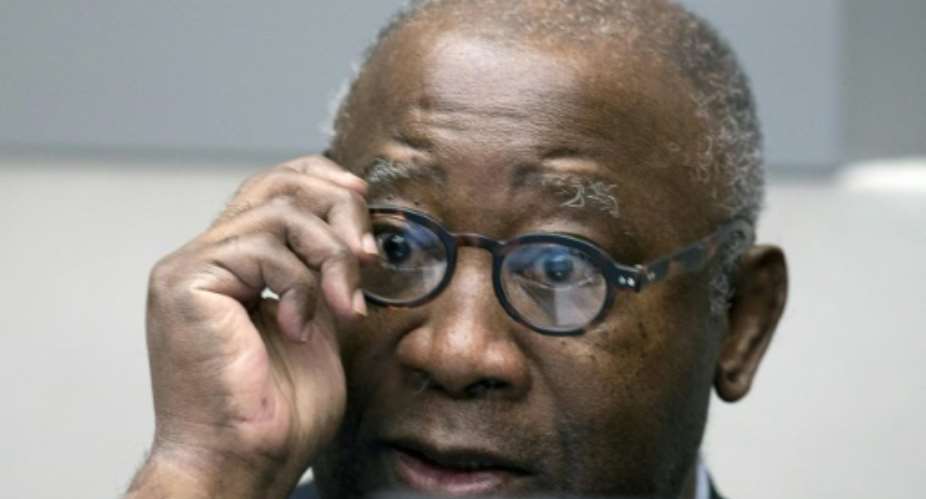The Hague (AFP) - Defence lawyers for fallen Ivorian leader Laurent Gbagbo on Monday accused his bitter rival President Alassane Ouattara of seizing power by force aided by former colonial power France, after disputed 2010 polls.
On the third day of Gbagbo's landmark trial, the defence team also lashed out at the International Criminal Court's prosecutors saying their case "twisted the truth" about the country's former president.
"Ouattara and his supporters wanted to seize power by force and the battle of Abidjan was, simply put, the very implementation of this strategy," lawyer Emmanuel Altit told a three-judge bench, denouncing what he called a "smear campaign" against his client.
Gbagbo and his co-accused Charles Ble Goude, a former firebrand militia leader, have denied four charges of crimes against humanity after 3,000 people were killed following the disputed Ivory Coast presidential vote.
Their highly-anticipated trial opened on Thursday at the court based in The Hague and is set to last three to four years.
Gbagbo declared himself the winner of the November 2010 elections, but major powers including France, the former colonial power, the United States and the United Nations backed Ouattara, who had snatched a narrow victory.
The row triggered a bitter standoff that saw Gbagbo holed up in the fortified presidential palace and Abidjan -- the country's main city and commercial capital -- turned into a war zone.
- French support -
"France did not want peace to be negotiated," Altit alleged.
The then French president Nicolas Sarkozy "had shown unwavering support for his friend Ouattara," defence lawyer Jennifer Naouri told the court.
Dressed in a dark suit, light blue shirt and dark blue tie, Gbagbo listened intently throughout the hearing but declined to make a statement as his defence team wrapped up its opening statement.
Ble Goude's lawyers are to open their case on Tuesday, and he is thought to have asked to address the tribunal.
Gbagbo became the first ex-head of state to go on trial at the ICC and chief prosecutor Fatou Bensouda painted a vivid picture of five months of turmoil saying "the Ivory Coast descended into chaos and was the theatre of unspeakable violence."
- Re-writing history -
She alleged on Thursday that Gbagbo, aided by the military, police and a youth militia group organised by Ble Goude, had clung to power by "all means necessary" as part of an orchestrated plan.
But Altit countered Monday there had been a deliberate campaign to make Gbagbo "out to be some kind of demon" and "paint Ouattara as the good guy."
"This is nothing more than a political narrative that has been heated up and re-served."
Defence lawyer Dov Jacobs added: "It has been shown that the prosecution has twisted the truth" by not contextualising the violence.
"It has deprived the Ivory Coast of part of its natural history," Jacobs added.
"Perhaps someone wants us to forget" alleged abuses committed by pro-Ouattara forces, Altit said, adding that even before the elections Ouattara had been recruiting mercenaries in neighbouring Burkina Faso, where preparations for the assault on Abidjan were made.
"The plans for military action had been drawn up by the plotters and schemers ... in cooperation with French military leaders during the entire crisis," he said.
He added that French military aircraft also delivered heavy weapons to pro-Ouattara combatants.
If the two men are convicted, the maximum penalty is usually up to 30 years in prison. Judges can impose a life sentence if they find "extreme gravity" in the case.
Prosecutors are focusing on four specific incidents triggered in the world's top cocoa producer, once held up as a beacon of democracy in a troubled continent.
Altit regretted that no French witnesses had been called by the prosecution, saying only they "have the information needed to get" to the truth of what happened.
The ICC has been repeatedly accused by some African countries of unfairly targeting them. Several continental heads of state on Sunday backed a Kenyan proposal to pull out of the ICC on the ground that it is biased at an African Union summit.





 Ejisu by-election: I will be shocked if Aduomi is able to secure 5percent vote —...
Ejisu by-election: I will be shocked if Aduomi is able to secure 5percent vote —...
 University President expresses worry over surge in provocative dressings, indisc...
University President expresses worry over surge in provocative dressings, indisc...
 Avetakpo residents lament disregard shown by Ho West officials, threatening to p...
Avetakpo residents lament disregard shown by Ho West officials, threatening to p...
 New Jakpa palace will be grand symbol of our history and culture — Mahama to Yag...
New Jakpa palace will be grand symbol of our history and culture — Mahama to Yag...
 Prof. Jane Naana has shaken Ghana's political foundation, causing NPP to run hel...
Prof. Jane Naana has shaken Ghana's political foundation, causing NPP to run hel...
 I've been receiving threats after I commended NPP for completing school projects...
I've been receiving threats after I commended NPP for completing school projects...
 Bawumia is ready to debate Mahama any day – Frederick Opare-Ansah
Bawumia is ready to debate Mahama any day – Frederick Opare-Ansah
 Register births at CHPS compounds; don't come to Accra – Birth & Death Registrar...
Register births at CHPS compounds; don't come to Accra – Birth & Death Registrar...
 We never said only 10 BVDs were auctioned – EC replies IMANI
We never said only 10 BVDs were auctioned – EC replies IMANI
 Election 2024: Akufo-Addo willing to trample on Ghana’s constitution – Mahama
Election 2024: Akufo-Addo willing to trample on Ghana’s constitution – Mahama
